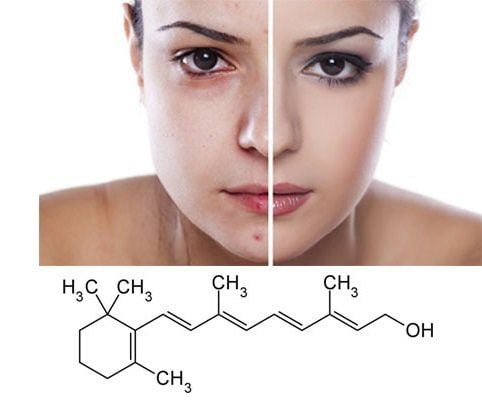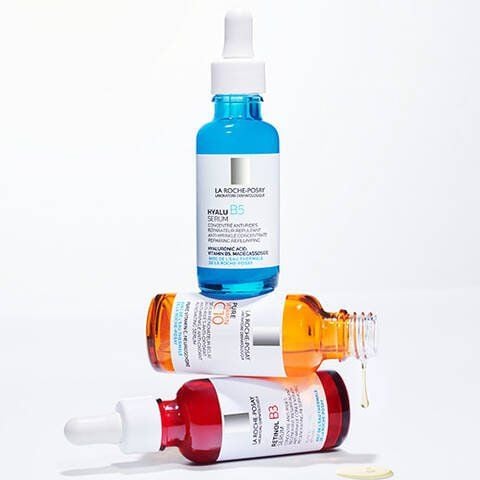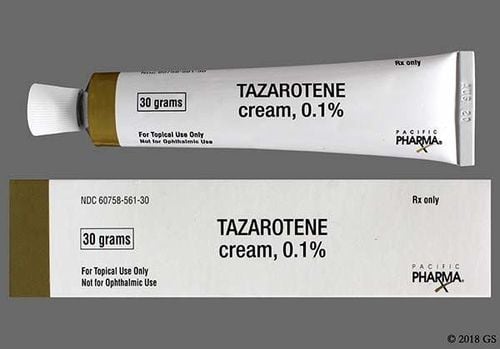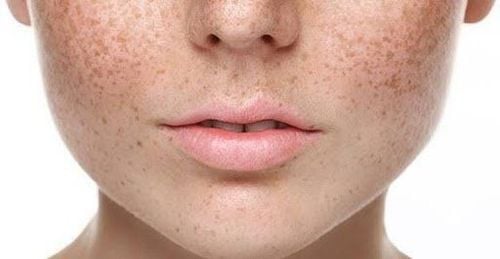This is an automatically translated article.
Retinol is a common ingredient added to skin care products and cosmetics. Retinol has the ability to boost the amount of collagen your body makes and plump your skin, reducing wrinkles. The best time to apply retinol is at night and apply moisturizer and sunscreen the next morning.
1. What is retinol?
Retinol is often considered a miracle skin care ingredient. However, some argue that retinol is an ingredient that destroys their skin, leaving others too scared to try it. But is retinol really capable of harming your skin? Or is it something that could change your skin care regimen for the better?
Contrary to some beliefs, retinol is completely safe to use on the skin. But if you abuse it and don't use it properly, retinol can cause some unwanted side effects.
Retinol is essentially a form of vitamin A suitable for the skin. It is in a group of vitamin A derivatives, known as retinoids. Some retinoids, including low-strength retinol, can be purchased without a prescription. Others, such as tretinoin, are stronger and can only be prescribed by a doctor.
Retinol has many uses, so it is widely used in the field of skin care. It can be used to combat conditions such as acne and areas of pigmentation. Retinol can also reduce signs of aging and sun damage.
Christopher Panzica, a licensed esthetician from Brentwood, Tennessee explains: As you age, the adaptation of skin cells and the ability of skin cells to produce collagen decrease. “When applied topically, retinols help bring your skin cells to life and return to a more youthful state,” he says.
How does retinol promote this effect?
Panzica says, “The strengthening helps speed up cell turnover to keep pores clear, reducing acne,” adding that it also “improves texture, fine lines, and wrinkles.” and skin luminosity”. Additionally, says Panzica, “retinol increases collagen production in the dermis to provide anti-aging protection.” In it, collagen is an essential substance to increase moisture and elasticity of the skin.
MORE: What's the difference between Retinol and Retinoid?
2. Does retinol have any side effects to watch out for?
Stronger retinoid drugs like Retin-A and Accutane are known to cause a long list of potential side effects. “People with sensitive or easily irritated skin should use retinol with caution,” says Panzica.
First-time retinol users have reported irritation, including redness, dryness, and flaking.
If you use too much or apply retinol more often than necessary, you may experience more severe irritation, like itching and scaly patches.
Some people have reported breakouts after using retinol, although this is a rare side effect.
Outbreaks of eczema, skin discoloration, swelling and stinging are also rare.
Side effects may go away after a few weeks of regular use, so it's important to give your skin time to adapt and adjust.
But if you are concerned, don't hesitate to talk to a dermatologist for proper advice before use.

Hiệu quả khi sử dụng Retinol
3. Who should not use retinol for skin care?
Panzica says: “Retinol can be a beneficial supplement for most skin types, but it is not a one-size-fits-all approach to skin conditions.”
Dermatologist Zenovia Gabriel, MD, is board-certified, noting that “people with sensitive skin conditions cannot tolerate really strong topicals like retinol.”
Also, avoid retinol if you are exposed to a lot of direct sunlight without proper sun protection. Retinol can make your skin more sensitive to the sun, so it's important to use a sunscreen with at least SPF 30 every day - even if it looks cloudy.
Some retinoids are also not recommended for people who are pregnant or breastfeeding.
Always consult a dermatologist before starting an intense retinol use or if you are concerned about the effects of a retinol.
4. How should retinol be used?
How can you add retinol to your skin care routine?
Panzica says: “While you may have heard some horror stories about retinol in the past, they can be safely included in a complete skin care routine. "Just remember that starting at a low dose and using it sparingly will see the benefits and limit the unwanted effects of retinol."
Panzica recommends seeing a dermatologist or specialist skin care professionals to find “a good, lower concentration retinol” to try. Then start by using it at night a few times a week.
Panzica adds: “Every week, if your skin improves, replenish at night until you apply it nightly or as directed.
When applying, clean, tone, and exfoliate first. (Only do all three of these steps if they are included in your current skincare routine.)
Then apply a pea-sized amount of retinol to dry skin. Apply evenly over face, avoiding eyes and mouth.
Then you can apply any skin lightening product, followed by a serum or night cream.
“Because retinol can dry out the skin, ideally you should use an effective moisturizer to help moisturize and protect the skin.” Gabriel noted.
Finally, don't forget to wear a broad spectrum sunscreen during the day.
If you're using any other topical acne treatments, talk to your dermatologist before using a retinol. You should also combine with gentle cleansers and make sure that only the layering ingredients work well together.
Gabriel says: “For example, vitamin C and retinol used together can be a pretty potent skin care solution for most skin types.”
Remember: Retinol is not a quick fix. Although prescription retinoids can work for several weeks, it can take up to 6 months for over-the-counter retinols to produce the same results.
You may notice a difference in conditions like acne after 12 weeks, but sun damage and signs of aging can take even longer to improve.
Whether you are worried about acne or pigmentation, retinol can surprise you with its effects. But over-the-counter products take time to work. That doesn't mean you should choose the strongest product you can find. Instead, start with a low-intensity formula a few times a week. Use slowly to avoid side effects and give your skin the best possible results.
Vinmec International General Hospital is the address for examination, treatment and prevention of diseases, including Dermatology. When performing the examination process at Vinmec, customers will be welcomed and used modern facilities and equipment along with perfect medical services under the guidance and advice of experts. Good doctors, well-trained both at home and abroad.
Please dial HOTLINE for more information or register for an appointment HERE. Download MyVinmec app to make appointments faster and to manage your bookings easily.













